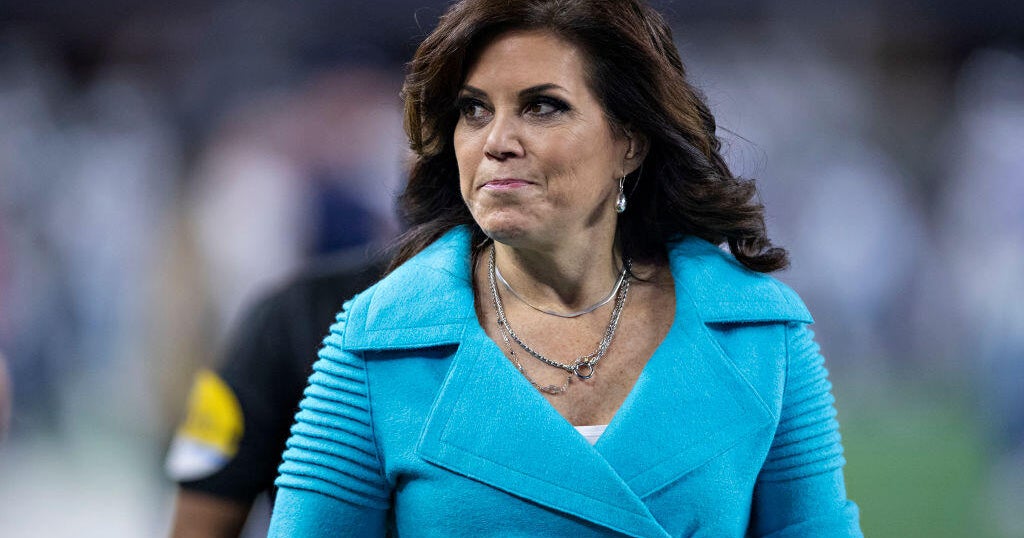Transcript: Sen. Kirsten Gillibrand, Jennifer Wexton on "Face the Nation," August 19, 2018
The following is a transcript of the interview with Sen. Kirsten Gillibrand, D-New York, and Virginia congressional candidate Jennifer Wexton that aired Sunday, August 19, 2018, on "Face the Nation."
MARGARET BRENNAN: We traveled to Sterling, Virginia this week to talk with New York Democratic Senator Kirsten Gillibrand and Jennifer Wexton, the Democratic candidate for Congress from Northern Virginia. We began by asking why a record number of women are running this year.
BRENNAN: So you draw a direct line between President Trump's election and the number of women running now?
SEN. KIRSTEN GILLIBRAND (D), NEW YORK: Absolutely.
BRENNAN: Based on not demographic shifts, but just pure protest?
GILLIBRAND: Protest, anger, frustration and determination to protect their families.
BRENNAN: You're running in a district that's been held by Republicans since the 80s. What you're seeing in terms of your pull-ahead in the polls. What do you attribute that to?
JENNIFER WEXTON (D), VIRGINIA CONGRESSIONAL CANDIDATE: I attribute it to my-- my background. You know, I'm-- I'm a mom. I'm a former prosecutor from the heart of the district, in Loudoun County. And I'm a state senator who, during my tenure in the-- in the Senate has passed over 40 bills.
BRENNAN: Why do you feel comfortable saying, 'I'm a mom and that's a good thing?'
WEXTON: Because we bring great things to the table. As women we are able to check our egos at the door, and work together to get things done and deliver results. As moms, we are able to prioritize and multitask all the many things that, that help us as legislators. And we're able to empathize and understand the issues that our constituents are facing.
BRENNAN: Do you think though, that in this particular race, it's kind of unusual? I mean, you're a woman running against another woman here, Barbara Comstock. Does that change the dynamic of the race at all?
WEXTON: Maybe a little bit, because we are both women, so we can't put it in that frame of a man versus a woman. But when you have a woman who is not voting in a way that helps other women, it's time to replace her.
BRENNAN: You know there's a number-- a record number of women running against other women, in addition to just being, you know, out there in the first place and putting themselves on the line, on the ballot. Would you also attribute it to President Trump?
WEXTON: I think Donald Trump has a lot to do with it. I think a lot of women woke up after the November election in 2016 and realized that democracy is a lot more fragile than any of us wanted to admit. And that the only way we were going to change things would be to get off the sidelines and run ourselves.
GILLIBRAND: The fact that Donald Trump has been accused by more than a dozen women of sexual assault and sexual harassment alone has infuriated women enough to do something that they might otherwise have not done. Taking the risk to actually run for office.
BRENNAN: But all those things came to light, or were accused-- he was accused of these things when he was running as candidate?
GILLIBRAND: Correct.
BRENNAN: He was elected regardless.
GILLIBRAND: Fair enough. But, the response to him being elected, I think, is this overwhelmingly-- the overwhelming desire of women to be heard, to be counted and to fight back against what he stands for and what he said. He demeans women. He devalues women. He's constantly trying to harm our families and our communities. And so women, when they know their family's being harmed, they will run through fire. They will do whatever it takes to protect their family.
BRENNAN: He would argue, as would the White House, he's not anti-women. He's actually endorsed your opponent--
GILLIBRAND: I would just read--
BRENNAN: --back in New York.
GILLIBRAND: I would just read his Twitter feed on any given day and you'll see he does not support women.
BRENNAN: The president made that personal in a rally this week up in your home state of New York and when he endorsed the woman running--the candidate running against you, he also slammed you. You've been very tough on him. But he was tough on you and said that you basically had no accomplishments, he hit you for coming and asking and seeking campaign contributions in the past. How do you respond?
GILLIBRAND: I think it was a very weak attack and frankly I was surprised it was the best he could do, um, but President Trump does not have a relationship with the facts. And as a New Yorker, he certainly should know that I've passed the 9/11 health bill twice to give health care to our first responders and the families that live in the community. As the commander-in-chief he should know that I led the charge in repealing Don't Ask, Don't Tell. So if he wants to come campaign against me in New York any time, he's welcome.
BRENNAN: Did you hear some of his criticisms, like his hit at you for asking for campaign contributions, as gendered?
GILLIBRAND: Yes, that was clearly a sexist smear and it was intended specifically to silence me and--
BRENNAN: Why did you hear it that way?
GILLIBRAND: --and the dozens of women who had just come out against him for sexual assault and sexual harassment and the millions of women who were marching against him since he became president because of what he said.
BRENNAN: Well this week the president referred to a former senior White House aide as a dog -- someone who had worked with him for years. Did, what did you hear when he said that phrase "dog"?
GILLIBRAND: I hear, again, a very sexist smear that's intended to demean her. He has--
BRENNAN: He's used it in the past against men.
GILLIBRAND: He has used racist words also, over and over again. He is intending to demean and devalue a former staff member and he's done that to women of color over the many months that he's been president.
BRENNAN: And yet, as we say, he's endorsing female candidates in this race, his successful campaign manager Kellyanne Conway, who is an adviser now, says that it's absurd to accuse him of being in any way sexist and actually says that she's being treated in a sexist way because she's a Republican and that her contributions aren't recognized by fellow women.
GILLIBRAND: I think she's wrong. And he can support women candidates who also don't share our values. Women are not a monolith, to assume they are is equally absurd.
BRENNAN: Do you think that we're going to see more female candidates run in 2020?
GILLIBRAND: I certainly hope so.
BRENNAN: Does 2018 get replicated? Or, is what happens in November going to decide who we see run against President Trump?
GILLIBRAND: I think what happens in November is going to decide what our country looks like. I think this election is a referendum on President Trump. On the fact that he doesn't represent most Americans. That his values don't line up with most Americans. And so being heard in this election sets the stage for everything in the future.
BRENNAN: Do you see it as a test case for 2020? That there could be, again, the Democratic candidate, a woman?
GILLIBRAND: I think you'll have many women run in 2020. I think you'll have a lot of diversity--
BRENNAN: Will you run?
GILLIBRAND: No, I'm running for Senate. And I'm running for re-election in my state, in November too. And I'm running against a woman too, which is--
BRENNAN: Yes.
GILLIBRAND: --a good thing. That is a good thing. To have more women running, Democrat and Republican
BRENNAN: And if you win that re-election, you're not precluding running in 2020 for president?
GILLIBRAND: I am solely focused on 18. And I think all of us are.
BRENNAN: Alright, we'll come back to you after-- after November.
BRENNAN: We invited Jennifer Wexton's opponent, Representative Barbara Comstock, but she did not accept our invitation to appear. We'll be right back.





